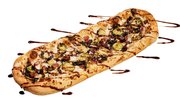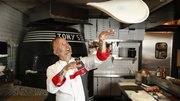Article
Restaurants build on international ground
Restaurants look to international shores to boost their brand and build an image.

March 26, 2007 by Valerie Killifer — senior editor, NetWorld Alliance
When Steve LaMastra took the helm of Raving Brands in 2005, he quickly made the conclusion the company needed to expand.
With several successful concepts — Moe's Southwest Grill, Mama Fu's and Doc Green's Gourmet Salads & Grill — steadily performing, LaMastra and the company set their sites abroad and opened their first Doc Green's in Singapore in January. They also have signed franchise agreements for the development of 150 restaurants, including Doc Green's and Moe's, in markets that include the Middle East and Canada.
"Our food and our experience is really compelling within our brand, and that's going to resonate with international consumers, we believe, as well as domestically," he said. "We're confident our concepts will be well received."
Raving Brands isn't the first fast casual banking on the international market to boost its image. Au Bon Pain, and plenty of others, also are following suit.
"We knew we wanted to expand again, but we were not actively soliciting international development," said Ed Frechette, senior vice president of marketing for Au Bon Pain.
But international development is what occurred for the Boston-based chain that now operates 35 franchised international locations that include units in Korea, Thailand, and Taiwan. Additionally, the company has signed an agreement to develop 300 locations in Japan.
"A big thing with international franchising is picking the right partners," said Sue Morelli, Au Bon Pain's chief executive officer. "We couldn't be more excited about the quality of partners we have attracted."
From here to there
But what makes the international market, especially the Middle East and Asian regions, such a hotbed of fast casual growth?
"Fast casual is not just a U.S. phenomenon," said Aaron Allen, founder and chief executive of Orlando, Fla.-Quantified Marketing Group. "It's finding its way to other countries as well. From the consumer perspective you get the best of both worlds: speed and higher-quality products at a price point that's in the middle."
There also is a demand for fast casual restaurants because they are rarely found outside the United States.
"The fast casual segment in particular is going to be well received (internationally) because there are not a lot of options in our segment," LaMastra said. "For example, the QSR industry is seeing more limited growth domestically than we are, but what we're going to see with our brands is less competition overseas. We believe that's true in Canada. In Canada ... fast casual again is just hitting its early-growth stride and we believe being there is going to give us a great first-mover advantage."
| ||||||||||||||||||||||
Shane Silver, co-founder of Canadian franchise group True North Brands, signed an agreement with Raving Brands March 12 to open 40 Moe's Southwest Grill locations there. Silver says the idea began after he and his partners noticed a gap in Canada's restaurant-market share.
"The fast casual segment really hasn't come to Canada overall," said Silver, who was introduced to the Moe's concept while living in Atlanta. "There are not a lot of places that offer fresh food in the casual dining environment."
Canada has many of the same restaurant attributes found in several other international locations: more quick-service concepts that have penetrated the market.
"Pizza Hut, McDonald's and KFC have established themselves in those markets and have paved the way for us to go and grow over there," LaMastra said. "The audience, just like the U.S., is growing and maturing."
But not all fast casuals are eyeing international soil as a way to build their customer base.
"As tempting as it is to be in rapidly expanding economies at a fairly early stage, to do it right one needs to have resources in terms of infrastructure," said Jim Greco, chief executive officer of Bruegger's. "I'm not sure it would be easy to find a partner that wants another American brand name to develop. Right now there is so much opportunity in the United States and Canada, that will probably our focus for the next couple of years."
From there to here
While so many U.S.-based restaurants are looking abroad for growth, a surprising number of chains are tapping into the Americas to boost their brands as well.
Allen developed the Vamonos Taqueria fast-casual concept so Mexico-based Grupo Anderson could enter the United States market. Grupo Anderson operates several restaurant concepts, including Carlos'n Charlie's and Señor Frog's.
The U.S. market is so appealing because consumers have more discretionary income and they typically "trade up" — opting for higher-quality ingredients at slightly larger price points, says Allen.
"Consistently every year, the restaurant industry takes a bigger segment of the pie between restaurants and grocery stores," he said. "Because the American marketing machine is so powerful ... they look at that and think 'I need to buy my way into the industry instead of going out on my own.'"
Related Media
Food & BeveragePresented ByOracle
Presented ByOracle
 ChatGPT
ChatGPT Grok
Grok Perplexity
Perplexity Claude
Claude













